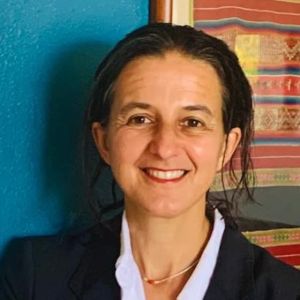Okay, well, thinking about the plebiscite of the year 88, I think that first I was 17, 16 years old, by the year 88 I was in third grade and what I remember the most is a sensation, I don’t remember much of the specific day, but I full year deal. Because I think it was a year in which there were demonstrations, demonstrations. There was a feeling of empowerment. There was a feeling of openness that we had not experienced before. There was like a vibe. There was an atmosphere of fear, but at the same time an atmosphere that something could be done. So, I think that for the young people who were between 15, 16 and 17 years old it was like a new feeling of freedom that we had not felt before; You could go to all these demonstrations. That thousands went to the demonstrations, the young, the women, the old, the children: with families, without families. So I remember, above all, that energy, from the year 88, that feeling that my backpack was all scratched up. And I was in a super momio school, absolutely facho. I think we were about three or four, the one that really came from a family from the No, and families from the left. But the plebiscite gave me a kind of strength to send them all and say No, we are from the No and enter the school with the backpack and with the No, apart from the fact that all the odds were scandalized. In other words, I think my first memory is that feeling of openness and joy and empowerment as a collective that I felt in the environment.
The environment, at school, was an environment like, it was like entering the YES campaign. I was in a school called Santiago College and it was a horrible school, I don’t know why I was in that school, because I came from a leftist family, but it was a feeling that it wasn’t just fanaticism of the Yes. You have to to think that Pinochet’s grandchildren were at that school at some point. So it was really like a fiefdom of the right [laughs]. But there was also a constant denial of everything that had happened in Chile. And I came from one, I come from a family on the left, a family where my mother had worked at the Vicaría de la Solidaridad and had completed the basic course in Latin American. So I came with a completely different environment and I arrived at that school in First Middle, so it was like a constant shock. It was, we fought constantly. In a minute they threw my backpack out the window and said “out with the reds from school.” They didn’t get to be violent, I think, because I laughed at them. I considered them a troop of fascists. But it was a feeling of really being in the lion’s den, that it really was… and I think that what I remember the most, perhaps with great sadness, is the denialism that existed. If they denied you Human Rights, they denied you everything and celebrated the dictatorship, the yes and everything, with extreme fanaticism.
But I remember that I… that my greatest joy was the day after the NO. It is having arrived at school with a feeling of triumph and that everyone was silent. I think that was the most…the final revenge. Well, I came, as I told you, from a family on the left where everything was talked about and everything was known, it is where my mother worked for many years at the Vicaría de la Solidaridad. After me, both parents worked in NGOs, that is, there was no mystery. We knew everything and I don’t remember that at some point they had to tell me because we were always aware. I had gone to Parque O’Higgins, I remember that in 1982, when I was 10 years old, my family, because they went to all the demonstrations, we had touched the pots of all possible departments. So none of this was a mystery. I believe that there was not always much awareness in my family. I also don’t remember having any friends or relatives who were on the right. Yes, not that they did not exist, but we did not maintain a relationship with them. Therefore, I was that the environment, my family, was a very political environment, very calm, but with a lot of conscience. And passing. How did you get here to the campaign? I don’t remember me. I lived with my mom and my brother. My mom worked a lot on the campaign. Somehow or another. And I think that on the day of the plebiscite, we did not see it. I think she left super early in the morning to vote and then she had to volunteer for something.
My mother is a social worker, so she was very involved with different social organizations, etc. And my dad worked in non-governmental organizations and also worked at what became the Academy of Christian Humanism. And I was not with him for the plebiscite. My parents are divorced, but I remember that the news that came to me from him and that I always have it as I imagine it, is that he was president of Mesa in Florida, in a store in Florida, and that not only counted the No votes, instead he shouted them. Then a friend told me that your father was the president of the table and shouted the votes of No. I do not know if it’s true. How exaggerated! It has always remained like my dad’s fantasy. And I can imagine it, he is very calm and very quiet, but I imagine her shouting the No votes in the Florida local. And I remember, I think my greatest memory that we had already fallen asleep with my sister. My mom came home very late at night, the day of the plebiscite and she hugged me and woke me up, she said “it’s over, it’s over”. And I think my mom was crying her eyes out. That’s the feeling that, that’s my greatest memory of my mom waking me up to tell me that she was over and that’s it.
And the following days, my memory began to mix a bit, I think, between the days following the plebiscite, and the beginning of Aylwin’s campaign. I entered the university, if that is the other one, I believe that I graduated from school in December 1989 and entered the university the first year of democracy in 1990. And I believe that there was a strange thing. That always felt like that college year because things calmed down as we went, it’s kind of all the debate there is now as to what really happened in the ’90s. But my feeling is that in college there wasn’t much going on. As I entered the Catholic University, I entered the East Campus, which was a little more mobile, had a history of militancy towards the campus, etc. But it was a feeling of how, look, a lot happened in our generation, like calm and that some of the political things were like postponed. That began to emerge perhaps the things of human rights, the Rettig report and all that. But I feel that the whole issue as a politician and of mobilizations kind of calmed down and in some way it was a sensation, I think that a psychological thing almost from all those years of dictatorship and suddenly there is a calm and people want to be calm somehow, I don’t know. But I have no recollection from college of anything happening. I even remember that the student centers lost relevance and not much happened, no. I think so. I believe my story, but thinking about that moment and the impact it had on all of us, I think it was one of the most beautiful political and social moments. I think it has that emotion that, I think perhaps compared to what is happening now with the vote for the new Constitution and finally with a closure. Perhaps also a bit when the Human Rights reports were delivered, which is also an important memory for me, especially the Rettig Report, but I think that 1988 had a mystique that perhaps has to do with all the years of violence, that recognition. And I believe that the truth, that feeling of joy and hope that perhaps later fades, that perhaps later does not have, is not channeled as everyone expected. But there was that one like that little window. How is that year? And I think that’s why the memories get mixed up a lot, because between 88, 89 I have that feeling that it was a single march. That we went from demonstration to demonstration, from flag to flag and I think it was part of that, of all that spirit that was a certain accumulation of hope and movement, and also the return of many people who had been returning to the return of the Inti-illimani that Tencha returned, it was like there is also a certain accumulation of news and people who arrived, new personalities, etc. And that was also diversifying the political environment of the debate a bit.



